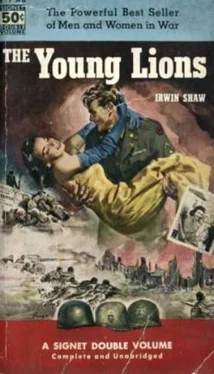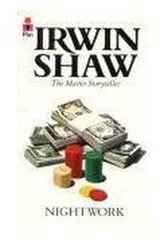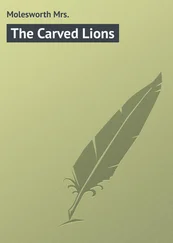Irwin Shaw - The Young Lions
Здесь есть возможность читать онлайн «Irwin Shaw - The Young Lions» весь текст электронной книги совершенно бесплатно (целиком полную версию без сокращений). В некоторых случаях можно слушать аудио, скачать через торрент в формате fb2 и присутствует краткое содержание. Жанр: Классическая проза, на английском языке. Описание произведения, (предисловие) а так же отзывы посетителей доступны на портале библиотеки ЛибКат.
- Название:The Young Lions
- Автор:
- Жанр:
- Год:неизвестен
- ISBN:нет данных
- Рейтинг книги:4 / 5. Голосов: 1
-
Избранное:Добавить в избранное
- Отзывы:
-
Ваша оценка:
- 80
- 1
- 2
- 3
- 4
- 5
The Young Lions: краткое содержание, описание и аннотация
Предлагаем к чтению аннотацию, описание, краткое содержание или предисловие (зависит от того, что написал сам автор книги «The Young Lions»). Если вы не нашли необходимую информацию о книге — напишите в комментариях, мы постараемся отыскать её.
The Young Lions — читать онлайн бесплатно полную книгу (весь текст) целиком
Ниже представлен текст книги, разбитый по страницам. Система сохранения места последней прочитанной страницы, позволяет с удобством читать онлайн бесплатно книгу «The Young Lions», без необходимости каждый раз заново искать на чём Вы остановились. Поставьте закладку, и сможете в любой момент перейти на страницу, на которой закончили чтение.
Интервал:
Закладка:
Michael watched Noah carefully, too. But Noah did not change the expression on his face. The expression was one of thoughtful, cool reserve, and Noah clung to it as a man clings to an expensive piece of clothing which he has bought with his last savings and is too precious to discard, even in the most extreme circumstances. Only once during the afternoon, when, on an errand for the Captain, Michael and Noah had to walk along the line of men who had been declared too far gone for help, and who lay in a long line on the dusty ground, did Noah stop for a moment. Now, Michael thought, watching obliquely, it is going to happen now. Noah stared at the emaciated, bony, ulcerous men, half-naked and dying, beyond reach of any victory or liberation, and his face trembled, the expression was nearly lost… But he gained control of himself. He closed his eyes for a moment, wiped his mouth with the back of his hand, and said, starting again, "Come on. What are we stopping for?"
When they got back to the Commandant's office, an old man was being led in before the Captain. At least he looked old. He was bent, and his long yellow hands were translucently thin. You couldn't really tell, of course, because almost everyone in the camp looked old, or ageless.
"My name," the old man was saying in slow English, "is Joseph Silverson. I am a Rabbi. I am the only Rabbi in the camp…"
"Yes," Captain Green said briskly. He did not look up from a paper on which he was writing a request for medical materials.
"I do not wish to annoy the officer," the Rabbi said. "But I would like to make a request."
"Yes?" Still Captain Green did not look up. He had taken off his helmet and his field jacket. His belt was hanging over the back of his chair. He looked like a busy clerk in a warehouse, checking invoices.
"Many thousand Jews," the Rabbi said slowly and carefully, "have died in this camp, and several hundred more out there…" the Rabbi waved his translucent hand gently towards the window, "will die today, tonight, tomorrow…"
"I'm sorry, Rabbi," Captain Green said. "I am doing all I can."
"Of course." The Rabbi nodded hastily. "I know that. There is nothing to be done for them. Nothing for their bodies. I understand. We all understand. Nothing material. Even they understand. They are in the shadow and all efforts must be concentrated on the living. They are not even unhappy. They are dying free and there is a great pleasure in that. I am asking for a luxury." Michael understood that the Rabbi was attempting to smile. He had enormous, sunken, green eyes that flamed steadily in his narrow face, under his high, ridged forehead. "I am asking to be permitted to collect all of us, the living, the ones without hope, out there, in the square there…" again the wave of the hand, "and conduct a religious service. A service for the dead who have come to their end in this place."
Michael stared at Noah. Noah was looking coolly and soberly at Captain Green, his face calm, remote.
Captain Green had not looked up. He had stopped writing, but he was sitting with his head bent over wearily, as though he had fallen asleep.
"There has never been a religious service for us in this place," the Rabbi said softly, "and so many thousands have gone…"
"Permit me." It was the Albanian diplomat who had been so useful in carrying out Green's orders. He had moved to the side of the Rabbi, and was standing before the Captain's desk, bent over, speaking rapidly, diplomatically and clearly. "I do not like to intrude, Captain. I understand why the Rabbi has made this request. But this is not the time for it. I am a European, I have been in this place a long time, I understand things perhaps the Captain doesn't understand. I do not like to intrude, as I said, but I think it would be inadvisable to give permission to conduct publicly a Hebrew religious service in this place." The Albanian stopped, waiting for Green to say something. But Green didn't say anything. He sat at the desk, nodding a little, looking as though he were on the verge of waking up from sleep.
"The Captain perhaps does not understand the feeling," the Albanian went on rapidly. "The feeling in Europe. In a camp like this. Whatever the reasons," the Albanian said smoothly, "good or bad, the feeling exists. It is a fact. If you allow this gentleman to hold his services, I do not guarantee the consequences. I feel I must warn you. There will be riots, there will be violence, bloodshed. The other prisoners will not stand for it…"
"The other prisoners will not stand for it," Green repeated quietly, without any tone in his voice.
"No, Sir," said the Albanian briskly, "I guarantee the other prisoners will not stand for it."
Michael looked at Noah. The pensive expression was sliding off his face, melting slowly, and violently exposing a grimace of horror and despair.
Green stood up. "I am going to guarantee something myself," he said to the Rabbi. "I am going to guarantee that you will hold your service in one hour in the square down there. I am also going to guarantee that there will be machine-guns set up on the roof of this building. And I will further guarantee that anybody who attempts to interfere with your service will be fired on by those machine-guns." He turned to the Albanian. "And, finally, I guarantee," he said, "that if you ever try to come into this room again you will be locked up. That is all."
The Albanian backed swiftly out of the room. Michael heard his footsteps disappearing down the corridor.
The Rabbi bowed gravely. "Thank you very much, Sir," he said to Green.
Green put out his hand. The Rabbi shook it and turned and followed the Albanian. Green stood staring at the window. Green looked at Noah. The old, controlled, rigidly calm expression was melting back into the boy's face.
"Ackerman," Green said crisply. "I don't think we'll need you around here for a couple of hours. Why don't you and Whitacre leave this place for a while, go out and take a walk? Outside the camp. It'll do you good."
"Thank you, Sir," Noah said. He went out of the room.
"Whitacre." Green was still staring out of the window, and his voice was weary. "Whitacre, take care of him."
"Yes, Sir," said Michael. He went after Noah.
They walked in silence. The sun was low in the sky and there were long paths of purple shadow across the hills to the north. They passed a farmhouse, set back from the road, but there was no movement there. It slept, neat, white and lifeless, in the westering sun. It had been painted recently, and the stone wall in front of it had been whitewashed. The stone wall was turning pale blue in the levelling rays of the sun. Overhead a squadron of fighter planes, high in the clear sky, caught the sun on their wings as they headed back to their base.
On one side of the road was forest, healthy-looking pine and elm, dark trunks looking almost black against the pale, milky green of the new foliage. The sun flickered in small bright stains among the leaves, falling on the sprouting flowers in the cleared spaces between the trees. The camp was behind them, and the air, warmed by the full day's sun, was piney and aromatic. The rubber composition soles of their combat boots made a hushed, unmilitary sound on the narrow asphalt road, between the rain ditches on each side. They walked silently, past another farmhouse. This place too was locked and shuttered, but Michael had the feeling that eyes were peering out at him from between cracks. He was not afraid. The only people left in Germany seemed to be children, by the million, and old women and maimed soldiers. It was a polite and unwarlike population, who waved impartially to the jeeps and tanks of the Americans, and the trucks bearing German prisoners back to prison stockades.
Three geese waddled across the dust of the farmyard. Christmas dinner, Michael thought idly, with loganberry jam and oyster stuffing. He remembered the oak panelling and the scenes from Wagner painted on the walls of Luchow's restaurant, on 14th Street, in New York.
Читать дальшеИнтервал:
Закладка:
Похожие книги на «The Young Lions»
Представляем Вашему вниманию похожие книги на «The Young Lions» списком для выбора. Мы отобрали схожую по названию и смыслу литературу в надежде предоставить читателям больше вариантов отыскать новые, интересные, ещё непрочитанные произведения.
Обсуждение, отзывы о книге «The Young Lions» и просто собственные мнения читателей. Оставьте ваши комментарии, напишите, что Вы думаете о произведении, его смысле или главных героях. Укажите что конкретно понравилось, а что нет, и почему Вы так считаете.











